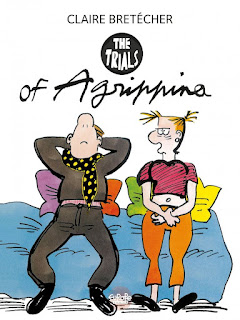The Agrippina stories, about an unimpressed teenager in the "modern" world, were published from 1988-2008 in French. I've heard of them - I think most recently and clearly when their creator Claire Bretecher died in 2020 - but I don't think they've been available in English consistently or perhaps ever. Reading between the lines, Bretecher used an invented, baroque version of French teen slang in these books, and translating that to English was clearly a major hurdle. (Edward Gauvin translated this edition; I have issues with the text that I'll mention in a minute, but his translation is sprightly and amusingly idiosyncratic.)
So I finally read my first book of Bretecher's, 1992's The Trials of Agrippina (les combats d'Agrippine in French), which is presented as the first volume in this version from Europe Comics. But, unless something odd is going on with the titles, that seems to be the third book of the original series.
I go into this detail because, while reading, I kept wondering "when is this?" Agrippina and her friends don't have phones or computers: it felt more like my teenage years than those of my (now-adult) sons. My guess, during reading, was a vague '80s-'90s feeling, and I'm happy, I suppose, to see that I nailed it pretty closely: the first Agrippina book was in 1988, and it looks like the background stayed mostly consistent through the last book in 2008. (Just before the smartphone era, as it happens.)
The other thing I kept thinking while reading was "what does that say?" This is a French album, so originally on larger-size pages, but I read it digitally, since it was only published digitally. That shrinks everything to begin with. The text is lettered in a fussy, scripty font, I assume because it's all dialogue, and that makes it look quick and authentic. I also assume, without evidence, that is based on the lettering in the French originals; if this was a new creative choice, I am very angry at someone.
What's my point? This book is very difficult to read physically. The words are cramped and in a font that fights legibility. The phrasing is odd and quirky. The names are wordplays based on allusions to things French people in the '90s would recognize: Bergere Leprince, Morose le Hachis, Morphee Naumann.
And the humor is arch and mannered to begin with. Agrippina is a faux rebel, like all of her friends, aping ennui and obsessed with trivial things, while the older generation are the usual morally compromised losers in stories about teenagers. All of them are superficial in their own ways, nattering on at length about silly things - so the reader has to be able to scan the text, understand it on the surface quickly, and also make judgements about these characters on a deeper level.
The book physically fights against that from the first page. I found myself squinting around my glasses, blowing up individual panels, and making guesses about things like "Ben Zynsgzwa" (?) over and over and over again, making every last panel an effort of decoding and interpretation. If there's a better way to destroy any humor in a book, I don't know it.
Now, I think this book is also somewhat out-of-date to begin with, its concerns those of a previous generation, which doesn't entirely help. But it could be much better if presented properly, in a format that English-speaking people can understand quickly - a lot of the wordplay would have been really funny if I could have just read it rather than decoding it.
The substance of the book is a lot of short stories, most of them just one comics page, most often nine or twelve panels squashed up against each other without gutters, most often with a single Feiffer-esque viewpoint that's repeated in every panel. Bretecher's art is quick and light, which gives that bland layout some more energy and movement, but the style of this book is pretty old-fashioned.
All in all, you may guess that I was not thrilled with The Trials of Agrippina. The book design and lettering do their best to hide and obscure what is good and interesting about this work, and time has taken a few potshots at it as well. I may read Bretecher again, but I would want to make sure I can actually read it before diving in.

No comments:
Post a Comment